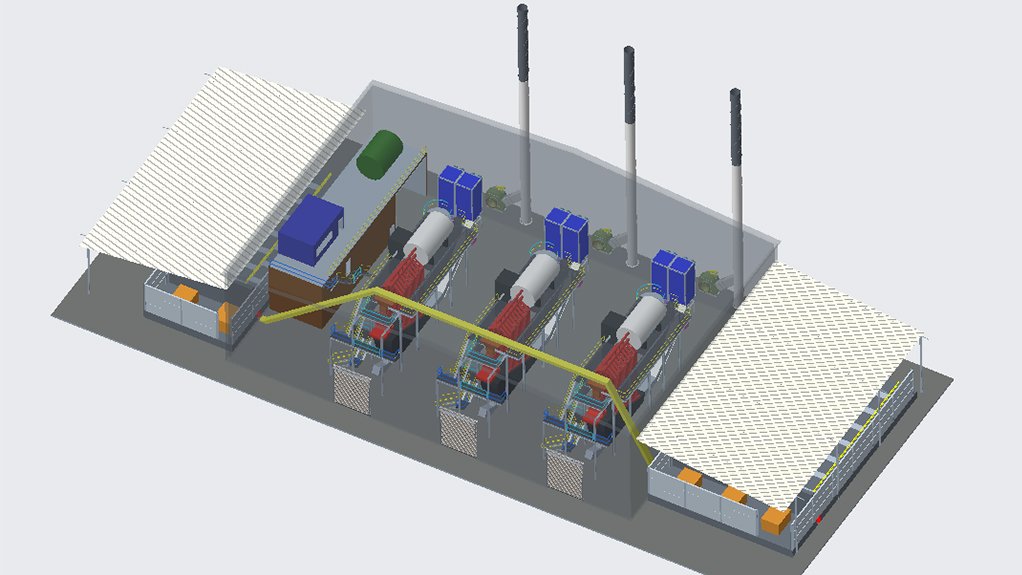Energy plant operations and maintenance company Associated Energy Services (AES) is working on an operational optimisation project for a client in the fishing industry to install an additional 60 t/h of boiler plant capacity.
The turnkey boiler project includes a new steam plant, with fuel and ash handling, as well as water and ancillary systems; its completion is expected in April 2024.
The project includes specification of the plant layout, plant selection, installation, commissioning and testing to provide a completely functional steam plant that will meet design parameters upon completion.
AES is also providing technical management and oversight for the client’s existing steam generation plant to manage risk and identify opportunities for optimisation in the interim, highlights AES commercial director Dennis Williams.
“AES was appointed on the basis of its innovative design, layout solution, expertise in project optimisation and extensive experience of more than 40 outsourced energy operations contracts, a footprint of 24 current client sites, and over 70 boilers currently under management.”
The company’s equipment and operational expertise, its proven record of steam plant operations applications, its work on projects including emission abatement solutions, as well as its configuring and incorporating fuels and control technologies, has positioned AES as a “trustworthy service provider”, he adds.
Williams says that a second steam plant project for a company in the dairy industry required engineering and operations expertise, with full-time operational responsibility for a biomass plant. The operational optimisation of the biomass steam plant was started after the completion of the plant installation in June 2023.
“The current focus is on plant reliability and efficiency, with us making adjustments to optimise the boiler solution provided by a third-party contractor. Our extensive biomass operational experience translates into first-hand knowledge of what must be done to optimise the plant post-installation to ensure effective and efficient operations,” he notes.
Changes in the Sector
Williams states that there has been substantial focus on the efficiency of overall steam and energy systems, and that the South African food and beverage producers are “making every effort” to minimise input costs by operating as efficiently as possible to cushion the effects of the harsh financial climate.
Significant interest in alternative fuels to reduce the carbon footprint of energy operations has prompted AES to invest time and expertise in relevant technologies and fuel access to provide solutions in the form of standby power, and the integration of power and thermal energy production in the form of cogeneration where possible.
“With progressively severe loadshedding, clients have also focused on standby power supply and the possible integration of power and thermal energy production in the form of cogeneration,” he emphasises.
Operationally, AES’ offering is centred on operational optimisation, with guaranteed operating efficiencies in its service-level agreements as it continues to seek out and identify new technologies, Williams points out.
The company is committed to guaranteed operational efficiency on fuel use and guaranteed plant availability, mitigating health and safety risks, as well as the opportunity for improved environmental performance through optimised efficiency for projects.
He adds that alternative energy solutions and optimisation in current manufacturing processes support production facilities’ needs to optimise energy use and the quality of energy supply, maximise efficiency, mitigate risk and, ultimately, improve plant uptime.
Williams stresses that ageing plants and equipment – installed before the current range of energy- related technologies were available – necessitate new systems integration and technology at energy plant sites as part of recapitalisation efforts.
This includes the integration of energy systems such as waste heat recovery, cooling and heating system integration, control system upgrades and the incorporation of Internet of Things technologies.
Challenges
Many food and beverage production facilities encounter two factors that impact on their operating efficiency: the short life of fresh produce and raw materials, hence early processing ensures better-quality dairy, fishing and canned food products; and production plants running with limited spare production capacity, Williams asserts.
“Clients tend to do this for as long as possible before considering extra capital investment to expand their production facilities . . . lost production, therefore, equates to lost opportunity and profit, as competitors take up the supply capacity that the client cannot get to market. Consequently, AES’ ability to maximise the supply of energy becomes instrumental to clients’ profitability.”
In response to economic challenges faced by companies in the industry, he says companies are facing significant pressure and expectations regarding continuous improvement; however, the reality is that opportunities to optimise an existing plant are limited without revising the total energy footprint and systems, resulting in substantial pressure on finances since substantial capital input can be required.
Nonetheless, Williams concludes that AES is counteracting these challenges by optimising clients’ installed plant and will present high-level proposals for alternative plant configurations. This, in turn, will require capital investment or process changes and, where specific projects are of interest, AES will review and present detailed offerings that can even include funding of the plant changes.
Edited by: Nadine James
Features Deputy Editor
EMAIL THIS ARTICLE SAVE THIS ARTICLE
ARTICLE ENQUIRY
To subscribe email subscriptions@creamermedia.co.za or click here
To advertise email advertising@creamermedia.co.za or click here













